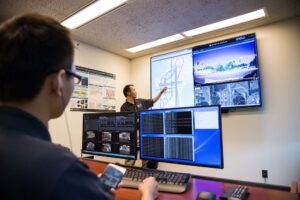Let’s roll
The University of Michigan will continue to lead regional efforts aimed at transitioning the nation to connected and automated vehicles —bolstered by a new $15-million, five-year grant from the U.S. Department of Transportation.
That grant renews and expands the Center for Connected and Automated Transportation (CCAT), based in Ann Arbor and led by U-M. The partnership now brings together nine colleges and universities to focus on significantly advancing the U.S. transportation system with emerging technologies that address safety and sustainability.
Announced in 2016 and funded with $15.76 million over its first six years, CCAT is one of 10 regional USDOT University Transportation Centers nationwide. Since that time, the center, which originally included six institutions, has produced a broad range of research that includes:
- The creation of an augmented reality testing environment to help train autonomous vehicles on how to respond to dangerous traffic incidents.
- Combining human capabilities and artificial intelligence to create “instantaneous crowdsourcing” to back up onboard autonomous systems.
- Platooning connected and automated freight trucks to reduce traffic delays and wear and tear on roads.
- Using data from sensors at intersections to augment the data provided by on-vehicle sensors to more accurately identify and locate pedestrians and other vehicles.
CCAT partners also engaged with more than 400 undergraduate and graduate students and oversaw the creation of several educational courses for kindergarten level through college. The courses reached students at Washtenaw Community College, Purdue University, and U-M.

Professor Liu shows off part of the Michigan Traffic Lab, where simulated connected vehicles can interact with real vehicles inside the adjacent Mcity Test Facility. (Image: Austin Thomason, Michigan Photography.)
“Our University Transportation Center’s work has had a profound impact on the U.S. driving environment — from reduced traffic congestion to improvements in the safety testing of AVs,” says Henry Liu, professor of civil and environmental engineering. He is director of both CCAT and Mcity, a U-M-led public-private mobility research partnership. “We’ve also made strides in preparing a workforce for the continued development and deployment of connected and automated transportation technologies.”
Headquartered in Ann Arbor, the center sits near the heart of the U.S. auto industry and represents Illinois, Indiana, Minnesota, Ohio, and Wisconsin, as well as Michigan.
“CCAT has also collaborated heavily with industry to establish Southeast Michigan and the Midwest as the definitive regions for connected and automated transportation and mobility,” Liu says.
Original CCAT members include Purdue University, the University of Akron, the University of Illinois, Washtenaw Community College, and Central State University in Ohio. The new additions are Northwestern University, the University of Minnesota, and the University of Wisconsin.
“The renewal of CCAT is critical to our mission to bring safe, equitable, and efficient transportation solutions to individuals and communities around the world,” says Jim Sayer, director of the U-M Transportation Research Institute (UMTRI), where CCAT is housed.
“Over the next five years, CCAT will continue this vital research with our new partners from Northwestern, Minnesota, and Wisconsin, as well as create more opportunities for underrepresented students through the creation of the Internship Student Program in Research Engineering.”
An expansive portfolio
CCAT is part of an expansive U-M portfolio of research tied to the future of mobility. In September 2022, the National Science Foundation awarded $5.1 million to Mcity to enhance its test facility, which opened in 2015 as the world’s first purpose-built test environment for connected and autonomous vehicles. The augmented reality testing environment developed by CCAT is deployed there.
Mcity is developing next-generation digital infrastructure for AV testing and training, adding new virtual reality software and using real-world datasets to create tailor-made simulation scenarios for AVs. The system will eventually be available for remote tests by researchers in the U.S.
In addition to Mcity and UMTRI, U-M is home to the Walter E. Lay Auto Lab and is a founding partner of the American Center for Mobility in Ypsilanti.



BERN PEDIT - 1976
Not that I have extensively searched, but I see a looming crisis in the making because city planners are not talking about the impact of drones and flying cars.
Reply
DONALD ORNE - '55 bse(ce)
I was Director of the PATH program at University of California at Berkeley late 1990’s using $12M annually from Caltrans. Our objective was development of autonomous vehicles. We did not have adequate sensors so we instrumented roadways instead. And then we automated the vehicle steering, braking and throttle systems to follow the binary polarized instructions from embedded ceramic magnets.
We funded projects at all engineering campuses in California. There were a few lessons learned. First, we did not adequately define program objectives and expected deliverables. So, chosen researchers had too much latitude to follow their areas of interest rather than ours and occasionally viewed their grant as an entitlement. Second, we had enormous outreach to National Labs, Defense contractors and vehicle manufacturers and did not tap into that resource adequately. We did solicit proposals from the engineering campuses and these were evaluated by an expert panel. Later we convened a conference where the researchers presented their findings.
Reply